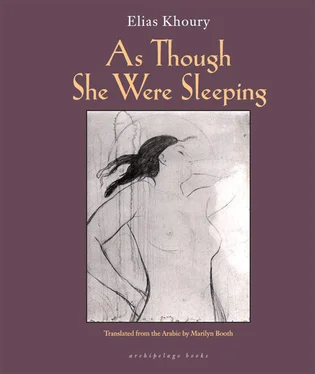Her chest, two lovely mounds, I see
camphoras capped by ambergris
What’s that you’re saying?
I’m saying poetry.
Why — are you a poet?
No. I just love poetry.
And what else?
Echoes of Abla arc o’er me in my dream
kissing me thrice on my scarf-enwrapped lips
She bid me farewell and left me aflame
A fire in my bones concealed in my hips
Were I not alone in this empty place
damping with tears ardor’s white-hot coals
I would die of grief but I’d never complain
in my zealous watch — Full Moon that ne’er dips!
So, he would dream her?
Of course — how else to love her?
You mean, you fell in love with me in a dream?
I already told you I’m not a poet.
She noticed immediately how like her brother Musa he looked. It made her heart pound. She smiled, and that was the beginning that brought him eventually to stand up in the Church of the Archangel Mikhail and to walk shrouded in fog on the Shtoura Road. And there in the cold bathroom at the hotel he called out desperately to his mother for he sensed that death was on its way.
Well, no, that was not exactly the way it was. But this was how he told it to his wife three months into their marriage when he knew he wanted to open the file on that already buried story.
He did not say how intensely cold he had been in the bathroom, and yet he had not dared to return to the bedroom because he was afraid that to do so would only make things worse and harder to explain. As he sat on the toilet seat, the bathroom’s red tiles began to look and feel like blocks of ice burning his bare feet. Milia was knocking on the door and saying that she was going to call the doctor. No, Milia, no — I’m fine. Go to sleep, dear, it’s all fine, really.
He had no idea how his violently trembling lips actually produced the words but he heard her moving away from the door. His joints went completely limp and the shiver that his rib cage had kept imprisoned now leapt out and swept over him. Walking on tiptoe, he headed back to bed, his whole body shaking and his mind in despair. He stopped to warm himself in front of the stove before feeling his way into bed, where he would curl up around himself like a snail.
Milia was already asleep. He lay down, careful to leave a space between them. He pulled the covers over his body and head and heat began to penetrate his joints. He dozed off and then suddenly his eyelids flew open as though in fright, and he thought, I am a bridegroom on my wedding night and a just-married man must not go to sleep before taking the bride who lies next to him into his arms.
He told her he had not been able to sleep. His desire was so implacable. The image of her waist as she stood beneath the almond tree. . the curve of her abdomen and hips. . With each touch, every kiss, he began to regain the flavor of things. He began to collect the straying fragments of his spirit, scattered in the cold and the fear.
Today he saw her growing round and she told him she was pregnant, as if she were being born anew; as if the child in her belly would give Milia her ultimate shape. Seeing the red lines on her neck he remembered the story they had not told him. He wanted to know.
As for her — she had not cared. Her fixedly downward gaze, which had suggested to Mansour that bashfulness was this young woman’s hallmark, seemed now to take on another meaning. The gazes of this woman traveled only inside the world of arcs and circles in which she existed. Looking down, she saw the circle complete. She was closed upon herself and she would go where no one else might follow her.
He felt jealous. No, it wasn’t jealousy exactly. Distance — as if, with these circles of hers, the woman encloses a space, draws a line between herself and him, and leaves him powerless to break through it.
She said she was going to sleep and stood up.
Sit down.
As you like. And fine, you name him. I don’t know why you’re acting like this, I thought you would be happy the way any man is when he knows his wife is pregnant.
No, it’s not the name, he said. What I’m concerned about is something else. And he asked her about Najib.
It was the first time in two years she had heard this man’s name. Everyone in the family had stopped mentioning his name. If they needed to refer to him they would say that one there . The pronoun replaced the man, and so Najib had become a mere jumble of letters empty of flesh or sense.
Najib had disappeared as had his image and his name. Now here he was suddenly coming back at the very moment Milia was freeing herself of her past, and of the memories of those days. She wanted to say to Mansour that she didn’t know. Or, she wanted to say: No, it isn’t that I don’t know, but the story died and has been buried, and there’s no call for reviving it.
It was her grandmama Malakeh above all who taught her how necessary it was to distinguish between stories. She would scold her daughter Saadeh whenever she mentioned the name of her husband’s father and the story of the house he had bought.
The story that goes rotten has to be buried, said Grandmama. Stories carry odors.
This grandfather, Saadeh’s father-in-law, had caused the women of the family deep and chronic pain. It was imperative to forget the story of the house. The woman who had lived there had to be buried along with the story. No one spoke now of the Egyptian woman, or of Khawaja Efthymios, or of the scandal that flared up when the grandfather bought the house after the death of his lover who had been the mistress of another man. So why, now, would Mansour want to resurrect a story that Milia had buried?
At least for Saadeh, finally the nightmarish business of the priesthood and the monks seemed over. Wherever had that naughty boy gotten his ideas about the Jesuit monks and this Catholic business? He was the only one among his brothers to finish his education, saying he wanted to become a lawyer, but then he had started his interminable chant about joining the Jesuits, stirring up a veritable storm in the household.
His brother Haajj Niqula swore he would kill Salim after hearing the screaming match between mother and firstborn son. Niqula went into the liwan and returned to the dar wearing his father’s red tarbush. In a deep fierce voice he told his brother that he would kill him.
Does a brother kill his own brother? Salim shouted.
That’s how killing came into the world — brother killing brother. Cain killed Abel. Now Abel wants revenge. No one can mess around with me. These idiotic behaviors have no place in this house. It wouldn’t cost me anything more than a single bullet. And I can furnish the coffin easy, from my shop — with pleasure.
From that day on Niqula never, ever removed the tarbush from his brow. Through the tendons of the family ran shivers of fear. Saadeh did not know what to do. She went to her holy woman for advice. I have two boys, she said. The first wants to become a Jesuit monk and if he does, the second will be a criminal. What am I going to do?
A Jesuit! cried the nun. I take refuge in God from evil Satan! As though he is not even the grandson of Salim who first rang the bell of the Church of Mar Girgis in Beirut. That Salim was a true man! And now comes Salim the Younger who inherited his grandpapa’s name, but so what? He’s leaving the true faith — he’s leaving the Orthodox to go join the French! I spit on the Devil!
She made Saadeh spit on Satan, too, and then Saadeh asked what she ought to do to avoid this mess.
Is this brother serious about killing his brother? asked Sister Milana.
Saadeh confirmed it.
What a man! said the nun. He ought to have been your firstborn son. If Salim really wants to be a monk, he should go to Mount Athos in Greece. The monks there are the real thing — true Orthodox monks, praise the Lord!
Читать дальше












